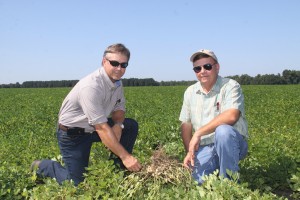Georgia Peanut Tour attendees visited the farm of Lee and Charlie Cromley in Brooklet, Georgia. Brooklet is a small town but it is known for the town’s annual peanut festival held in August. The event draws thousands of tourists each year to the small town. Visit the Brooklet Peanut Festival website to learn more about the event.
The Cromley’s farm just outside of town and grow 2,200 acres of cotton and 400 acres of peanuts. In the 300 acre field the tour group visited, the Cromley’s had planted the Georgia 06G and Georgia 09B varieties. The peanuts were planted the first week of May. The field has been very dry in August but over the last 10 days they have had 8-inches of rain which is preventing them from being able to get in the field and dig the peanuts. They are very innovative and on the cutting edge and they are looking for things to do better to improve yield.
The Georgia 09B is a high oleic variety where farmers are paid premiums to plant from several candy manufacturers that want more high oleic peanuts grown. However, less than 10 percent of the peanuts grown in Georgia are high oleic. One of the advantages of high oleic peanuts is the longer shelf life.
Lee Cromley says, is seems like more farmers should be growing a high oleic variety since it has several advantages. However, he says they have struggled with yield on the high oleic peanuts. “We planted another high oleic variety, Georgia 02C, a few years ago and that is a tough variety to manage from growth and maturity standpoint.” Cromley says. “Now, we have more varieties that are easier to manage and the yield is getting better. Even though yield drag is still 400 to 500 lbs. behind other non-high oleic peanuts. However, with the premium paid we feel like we will be fine with the reduced yield.”
Several companies like Hershey’s would like high oleic peanuts. However, it all comes down to the economics for growers.
“The market place is not built yet to accept high oleic and a grower wants to grow what yields and pays him back,” says Scott Monfort, University of Georgia peanut agronomist. “If everyone adopts high oleic peanuts right now then there would not be a premium offered and the premium is offered to offset the yield loss of those varieties. Without the premium that would negate the reason to grow high oleic peanut varieties today with reduced yield. We need to work on producing high oleic varieties that have the yield potential of Georgia 06G.”

